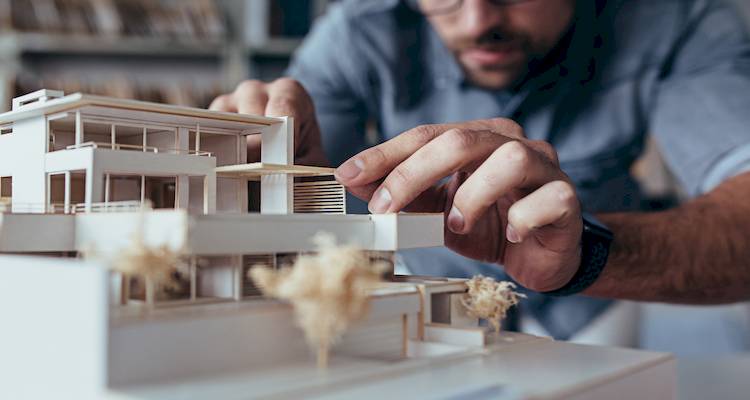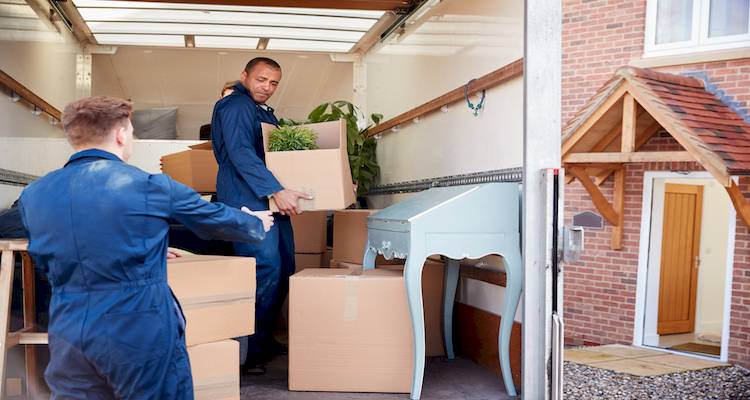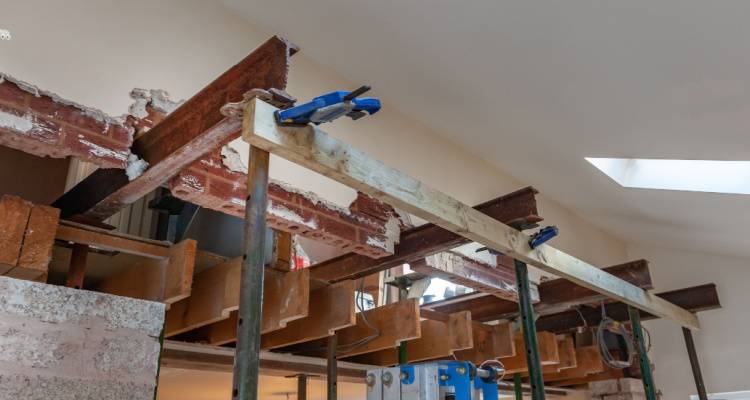How Much Does An Architect Cost?
- The average cost of hiring an architect is around £4,500 in the UK.
- It can take between 4 and 8 weeks for an architect to complete the job.
- A complete pricing breakdown which includes cost factors to consider and types of panels, along with what such a task usually involves.
- How long the job should approximately take and a general overview of what types of services can be performed.
- How to find and hire an architect near you.
Looking to find out how much an architect costs in the UK?
If you are planning home improvement projects, such as a loft conversion or a house extension, you may need to hire an architect to help you bring your ideas to life.
The average cost of an architect's services will be around £4,500, but the price you're quoted will vary depending on a number of factors — such as the size of the project and how much involvement you need them to have.
In this guide, we'll show you what it costs to hire an architect for different types of projects, what factors impact the quotes you get, additional jobs you might need to budget for, and how to find and hire an architect.
Ready to get a quote from an architect?
Get free, no obligation, no hassle quotes from architects near you who can help design, plan, and oversee your project. MyJobQuote is fast, easy, and used by more than 1 million homeowners across the UK every year.
Want to find out more before you start getting quotes?
Continue reading below!

£4,500
Table of Contents
- How Much Do Architects Charge?
- How Do Architects Charge for Their Services?
- What Impacts the Cost of an Architect?
- Additional Architect Costs
- What's Involved in Hiring an Architect?
- Building Regulations & Planning Permission for Common Architect Jobs
- Types of Architect Jobs
- Checklist for Hiring an Architect in the UK
- FAQs
- Sources
How Much Do Architects Charge?
Architects can design plans for your developments and advise you on how to maximise light and space. They also understand your local authority's planning laws and will also be able to guide you on who to contact and what to do.
Even the smallest projects can benefit from the expertise of an architect or an architectural technologist — but it's important to keep in mind that architect fees aren't cheap.
So, how much is an architect?
If you only need plans drawn up, the cost of planning drawings for planning applications begins at £5,000 for extensions, £7,000 for small-scale conversions at a fix fee, and £10,000 for small-scale new build schemes. The costs will rise proportionately if they take on more work, such as evaluating the site, drawing up plans, sending the application, and managing the build.
Architects' fees for creating building regulations and tender drawings start at £7,000 for extensions, £9,000 for small-scale conversions, and £12,000 for small-scale new property schemes. Depending on the size and scope of your project, fees for a full architect's offering, from concept to completion, vary between 8% and 15%.
If you are building a new home on an empty plot of land and looking to hire an architect to accept your plans from conception to completion, and the overall project is expected to cost around £150,000, the architect will charge 8% of the total cost, which comes to £12,000.
Architect fees for extensions are measured in the same way as fees for new builds, though, as previously stated, the overall percentage tends to be higher due to the additional difficulty of extension projects. For example, an architect charging a 10% fee would charge £5,000 for a two-story extension project that costs £50,000.
Once I've engaged an architect, will they be able to tell me what specialist trades I need?
Architect Prices
| Project Cost | 5% Fee | 8% Fee | 10% Fee | 12% Fee |
|---|---|---|---|---|
| £20,000 | £1,000 | £1,600 | £2,000 | £2,400 |
| £50,000 | £2,500 | £4,000 | £5,000 | £6,000 |
| £100,000 | £5,000 | £8,000 | £10,000 | £12,000 |
| £250,000 | £12,500 | £20,000 | £25,000 | £30,000 |
How Do Architects Charge for Their Services?

An architect will usually charge in one of three ways:
- A one-time payment for a plan of action or drawings.
- A proportion of the overall project value, typically around 10%.
- A flat fee per hour worked on the project.
It would be a bit unusual for an architect to charge by the hour in the UK. However, knowing how much an architect charges per hour will be useful if they insist on this payment option and you want to stick with them.
The average hourly rate for an architect is between £50 and £100. The exact price you're quoted would depend on the size of the job, how complex it is, and how much experience the architect has.
I'm looking to start my first building project where I plan to build 36 garages on a vacant plot of land. Can anyone provide an estimate of how much I should allow for the architect and structural engineer?
If an architect charges a percentage rate based on the project's value, this rate can be anywhere between 1.5% and 20%. Smaller projects tend to have higher percentage architect fees, while large projects have lower percentage architect fees.
In the subsections below, we've brought together estimates of architect costs for different types of projects.
Planning Drawings for Development Applications
This will cost between £3,000 and £5,000. The cost will be determined by the type and size of the project.
Create Building Codes and Tender Drawings
This will cost between £5,000 and £8,000. The cost will be determined by the type and size of the project.
Service Charges for an Extension Architect
Drawings for regulatory requirements and construction drawings for contractors typically cost between £750 and £10,000. However, this will be determined by the size or type of extension you require.
If your architect handles program management, you can consider paying a percentage of the total cost of the work. For example, you can expect to pay between £17,500 and £21,000 for architect fees on an extension from start to finish.
Loft Conversion Architect Fees
The conversion size primarily determines the architect fees for a loft conversion. You will save money if you can accomplish the conversion without obtaining planning permission.
If you require planning permission, the architect fees will range between £2,500 and £3,500. Plus, an additional £3,750 to £4,500 to get the project ready for construction. If the architect is also the project leader, this will cost between £10,250 and £11,000 or more.
Renovation Architect Fees
You should budget between £2,000 and £3,000 for the design phase. You can expect to pay between £5,000 and £7,500 for the tender, building standards, and construction drawings for large renovations.
You will also have to pay an architect between £5,000 and £7,000 to oversee the work.
Architect Costs for a New House Construction
The architect cost will vary according to the size of the home. For a four-bedroom new build, for example, the cost of planning permission will be around £4,000 to £6,000. The tender process, technical designs, and building regulations approval will then cost between £18,000 and £20,000.
You can also expect to pay between £16,000 and £20,000 for project management. So you will require approximately £39,000 to £43,000+ in total.
What Impacts the Cost of an Architect?
An architect is an expert who plans, designs, and supervises building construction. They may work for a company or on their own. When hiring an architect to get the best value for the money, there are several factors to consider.
The Project's Scope
The project's size and scope typically determine the cost of employing an architect. For example, small residential projects are less expensive than large commercial projects.
Top architects in Singapore typically charge between £150 and £200 per hour, but this can vary depending on your location and the architect's experience.
The Project's Location
The cost of hiring an architect is also affected by the project's location. For example, major city architects typically charge more than those in smaller towns.
What are the best architect companies in London?
The Nature of the Project
The cost of hiring an architect varies according to the type of project. For example, projects requiring more specialised skills, such as developing a hospital or airport, will cost much more than simpler projects, such as renovating a kitchen.
The Level of Expertise and Experience
The cost of hiring an architect varies according to experience and expertise. Architects with more experience, for example, charge more than those who do not. The architect salary will be determined by their level of expertise.
Your Project's Nature and Complexity
Your costs will be lower if your company is small and all you need is plans or a site survey. However, if you are converting your home or building a new one but want the architect to draw up your plans or project manage the job, you will have to pay more.
Planning Permission or Building Regulations Approval
If work requires planning permission or building regulations approval, it is usually more expensive because the architect must complete more paperwork and/or make more calls and visits.
Whether You Hire an Independent Contractor or a Large Company
An independent consultant is likely to be less expensive than a large corporation. Using someone local may also be advantageous because they will be familiar with the area and the people in your local authority's planning department which will remove any confusion.
What can I do to keep architect costs down when planning an extension?
Additional Architect Costs
There are numerous costs to consider when creating a budget for your project. Some of the most common extra costs are listed below.
House Extension Cost
When it comes to building an extension, the final cost will be determined by various factors. The most crucial of these options is the size or type of extension you intend to construct. This is followed by the stage of finish you desire.

A basic finish with only the essentials built will cost between £900 and £1,700 per m². To enhance a high-quality finish with top-of-the-line and bespoke options throughout, the cost will be between £1,750 and £2,200 per m².
On average, a house extension costs around £40,000 in 2025.
By constructing more floors, you can reduce your cost per metre square. The more rooms you build, the less expensive the extra space per m². This is because a big portion of the costs is spent laying the groundwork for the new space.
Build a Garage
A garage can cost anywhere between £4,200 and £20,000 to build. This includes the costs and the hiring of a builder to complete the work. The type of garage, the work quality, and the size of the installation job can all impact the final cost.
Naturally, the higher the costs, the larger the garage. Similarly, your costs will rise if you want a high-quality finish or a costly garage door.
If you would like further information, please refer to our guide on the costs of extending a garage.
Cost To Build an Outbuilding
Your budget will determine whether you go bespoke or buy an off-the-shelf outbuilding. Handmade designs are more costly than off-the-shelf alternatives. In addition, most suppliers will expect you to take care of the groundwork and service connections.
If necessary, installing electricity and plumbing should be included in the cost of your outbuildings and provided in advance as a complete quote from your builder.
DIY kits from stores range in price from around £500 for small self-assembly shiplap timber summerhouses. The average price for larger tongue-and-groove wood log cabins, including assembly, will be around £8,000.
Prices vary depending on overall size, features, and finish, but they typically begin at £300 per m², delivered, built, and roofed. The cost depends on the type of construction you choose, such as brick, concrete, wood, or a prefabricated structure. It is also determined by the type or pitch of the roof, the windows and doors, and any necessary services.
A basic timber summer house will cost around £4,250, while a concrete garage will cost around £7,100. A simple brick-built garage will cost you around £4,500. If you want to upgrade the specifications with better roof coverings or other characteristics, such as plumbing for an outdoor tap, the price can be £13,500.
A small backyard office or studio should cost around £6,000 and £9,000 on average.
If you would like further information, please refer to our guide on the costs of building an outbuilding.
Building a House Cost
The average cost of building a house is £205,000, but the final cost can vary greatly. The location of your home and the size you desire are two major factors influencing the cost. A bungalow in the north of England, for example, may be significantly less expensive to build than a big, detached house in London.

You'll need to buy some land to build your home on, and you might discover that it's not just the London location that raises the price. The better the location, the higher the price will be. A plot with great views within a National Park or close to a popular resort, for example, may cost significantly more than a similar premise elsewhere.
Can a different architect be used to amend plans? The original architects we used are no longer in business and we don't want to start from scratch.
Furthermore, planning constraints may require you to adjust your design and use equipment that complements the surrounding environment. Before you can begin, you may need to perform groundwork or demolish old buildings. And every project necessitates the creation of a detailed plan that will cost around £2,000.
A new house costs between £1,700 and £3,500 per square metre. The cost of constructing a new home varies greatly due to the numerous construction methods available. The price you pay will vary based on whether you choose a classic brick-built home, a timber frame, or a prefabricated kit. However, style, size, and location are not the only considerations.
If you would like further information, please refer to our guide on the costs of building a new house.
What's Involved in Hiring an Architect?
When brought in to support the right projects, domestic architects are worth their weight in gold. Large-scale remodels, listed buildings and ambitious extensions are typical.

An architect will typically assist with any/all the following tasks, which aim to ensure that your project is built safely and following building regulations while also optimising the design and layout of your property.
- Property measurement and survey.
- Create 2D and 3D design schemes such as material advice, electrical, heating, or plumbing plans.
- Revisions to the preceding scheme.
- Prepare and submit drawings for planning permission to the LPA; you should read about your planning permission rights.
- Keep track of your planning application.
- Tender production and management such as liaison with/advising appointed contractors and material sourcing for the project.
From start to finish, managing the construction is usually charged hourly, separate from initial drawings and planning costs as laid out above.
It is vital to note that some architects will only focus on the structure's external walls, roof, and material makeup and will not give much thought to the interior arrangement.
Thus, you must raise this topic upfront before beginning your project. When I work with clients, it is common for them to send me their architect drawings so that I can advise and plan the interior layout.
Building Regulations & Planning Permission for Common Architect Jobs
Any extensive work you have done on your home will be subject to building regulations. However, it is not always necessary to obtain planning permission.
Permitted development enables you to do a lot of work on your house without applying for permission. This section will go over some of the various planning permissions or building regulations for common architect jobs.
New Garage
Before beginning any construction work, such as adding a garage, keep in mind that there are regulations concerning outbuildings that apply to sheds and garages and any garden buildings.

Most outbuildings are regarded as permitted development, which means they do not require planning permission, but there are some restrictions and conditions.
To begin with, the garage must not be built on land ahead of a wall that forms the main elevation of the dwelling house. The garage must also be single-story, with a maximum eave height of 2.5m and a total height of 4m for a pitched roof, 3m for other roofs, or 2.5m if it is less than 2m from the property boundary.
Furthermore, if you want to avoid planning applications, avoid any verandas, balconies, or raised platforms. Finally, it is important to note that permitted advancement does not apply to flats or maisonettes.
Extension
You must complete some documentation and then pass inspections to have the work accepted as meeting building codes. As the house owner, you are responsible for ensuring that the work is completed following building codes. In most cases, your lead contractor will see that it is completed.
A single-storey extension on a detached property can be up to 4m long and 3m long on any other type of property. The height limit is 4m, and the new construction should be done with materials that match the rest of the house. Only half of the garden space can be used.
Another alternative is to contact your local government. Most businesses have a planning department. These provide consultations to help you determine whether you need planning permission.
Architect prices for an extension can vary, depending on the work at hand.
Outbuilding
Permitted development rights apply to outbuildings. You'll need planning permission if your plans exceed the size limits or if your home is in a listed building or conservation area. When it comes to building permits, the intended use of the building is critical, so ensure you define how you plan to use the zone.
Buildings cannot cover more than 50% of the original garden of the property; the structure must be single-story, with a peak eave’s height of 2.5m and a total height of 3m. Verandas, balconies, and raised platforms are not covered by PD.
If you want to set up a small, detached building in your gardens, such as a garden shed or summerhouse, if the floor area is far less than 15 square metres.
New House
All new construction projects require planning approval and must adhere to building codes. Before building a house, you must first obtain full planning permission. You may have purchased a plot with the outline planning application, but you will need to have a detailed plan approved by your local council before you can begin construction.

If your application is denied, you must revise your plans and reissue them. Many factors can influence planning decisions, including environmental concerns, a lack of parking, noise, traffic, and the design of your home.
A planning permission application for a house costs £462. However, this does not include the costs of hiring an architect or consulting with your planning permission office. Surveys may also be required to assess flood risks and other environmental issues.
Furthermore, if you need to argue the planning action, you will have to pay an additional £2,000 for this process. So, when putting together a budget for a new home, keep this in mind.
Will an architect be able to help me create a sustainable and energy efficient home? Can they help with the design and planning of things like the heating and insulation?
When constructing a new home, Building Regulations must be followed. A home inspection will visit the site before work begins, during the construction process, and afterwards to ensure everything is satisfactory.
The inspector will begin by inspecting the excavation and foundation work, followed by the damp-proof course and drainage trenches. They will return at least twice after the main structure is completed.
These inspections are required for the house to meet building codes and receive a Completion Certificate. Electric wiring or boiler installation certificates will also be required. Your house must also meet structural, fire safety, ventilation, and energy efficiency standards.
Types of Architect Jobs
There are various types of architect jobs. We will go over the most popular architect jobs as well as what they entail in this section:
Drafter
Technical architect plans, as well as architect drawings, are created by an architectural drafter. They collaborate with other architects and engineers to use technology to transform architectural designs into technical drawings.
Pros
- ✔ Work in a team
Cons
- ✖ Everyone must agree to the design
Architect Designer
An architectural designer is typically in charge of designing the interior and exterior of structures and buildings. They typically work on various projects and plan and outline the completion of the design.

Pros
- ✔ Work on a variety of projects
- ✔ Can give you ideas
Cons
- ✖ Must have good communication
Senior Graphic Designer
A senior graphic designer uses physical and digital design tools to illustrate specific architectural designs. They will collaborate with architects and designers to plan, outline, and design building plans to assist in designing new structures.
Pros
- ✔ Will help you design
Cons
- ✖ Only good for buildings
Technician in Engineering
An engineering technician oversees resolving technical issues during the equipment development and design stages. These positions frequently overlap with architectural technicians, and they frequently create new equipment models.
Pros
- ✔ Solves issues
Cons
- ✖ It can be stressful
Architectural Technician
An architectural technician will work with designers, engineers, and architects during construction projects' design and development stages. They will typically create sketches, review plans, and keep a close eye on construction progress.
Pros
- ✔ Keeps an eye on the process for any issues
Cons
- ✖ They are not involved in the building process just to review
Job Captain
As the name implies, an architectural job captain is the team leader of architects in charge of overseeing all architectural design elements of a building project. These experts will supervise and manage the work of all drafters and architects under their guidance.
Pros
- ✔ Supervise and manage
Cons
- ✖ None
Planning for Structural Design
Building architects plan and design all aspects of a structure. They will work in various settings, including public organisations, governmental organisations, and private businesses.
Private and public dwellings, advertising plazas, building structures, and a variety of other building structures are designed by building architects.
Pros
- ✔ Work on different projects
Cons
- ✖ Usually for big projects
Architects for Projects
The project architect oversees all architectural elements and continues developing a project. In addition, they will oversee all architectural projects and coordinate plans, blueprints, and construction specifications.
Pros
- ✔ Develop the project
Cons
- ✖ Long process
Designer of Structures
A structural designer works with engineers and architects to create digital and physical drawings of structures. They oversee designing a building's functionality, interest, and safety and developing plans for other structures.
Pros
- ✔ Help with your interest and safety
Cons
- ✖ None
Engineer On-Site
These individuals will direct and supervise architectural projects for their respective firms. They oversee every aspect of an architectural project. This would include close supervision and guiding teams, delegating multiple design tasks, and providing pertinent technical feedback to ensure that a project is completed correctly and efficiently.

Pros
- ✔ Therefore supervision
Cons
- ✖ Have multiple design tasks
General Architects
General architects oversee the planning and developing designs for buildings, and they will work in a variety of industries. Every licenced professional general architect is trained in the scientific principles and design work required for new constructions.
Pros
- ✔ Plan and develop buildings
Cons
- ✖ None
Checklist for Hiring an Architect in the UK
Find an Architect by Word of Mouth
It's always preferable to find someone who comes strongly recommended by people you know and trust. Inquire with friends and family if they have any recommendations for architects.
Find an Architect You Can Work With
Your architect is the person you are entrusting with the design of your dream home.
While planning permission for certain projects will always be contentious, they will know what will or will not gain approval, understand the success rate of other projects in the area, and build a rapport with those deciding your fate.
Locate an Architect Whose Prior Work You Admire
Nowadays, one of the simplest and quickest ways to view previous work is through a company's website. A website will be their primary selling tool, and there will most likely be a few well-photographed projects for you to peruse.
This will show you the quality of their work, the architectural style they may specialise in, the materials they are familiar with, and the building systems they are used to working with.
It is critical that you like their work and believe they can give the style of home you desire.
Locate an Architect Who Will Listen to You
When you interview different architects for the job, you will discuss your brief with them, and they will most likely present various ideas on the spot about how to make your dreams come true.
But be careful that when you're discussing your must-haves and like-to-haves, they don't deviate from your plans. As creatives, their role is to develop your brief while also ensuring that they listen to what you want and do not try to change it.
Many homeowners will communicate their delight that their architect was able to design a home that was better than they could have imagined; however, be careful not to get carried away and sacrifice certain elements you've wished for, all because an impulsive designer went rogue as well as wanted to try something new.
FAQs
Do I need to hire an architect when building an extension?
Do architects charge for a consultation?
Do I need an architect to draw plans?
What factors should an architect consider?
Is it worth paying an architect?
Sources
https://kayahomesonline.com/4-factors-that-affect-the-cost-of-hiring-an-architect.html









